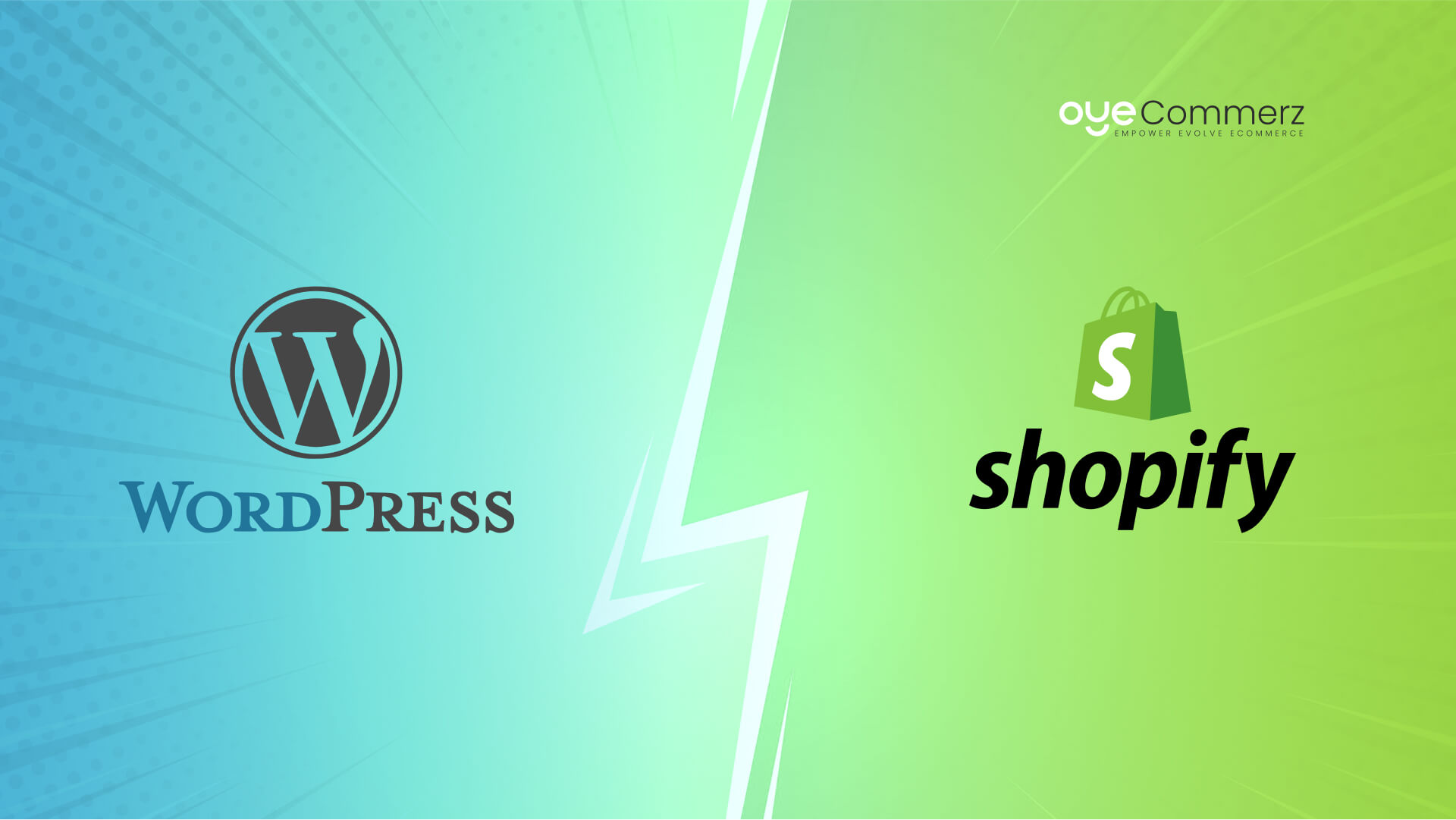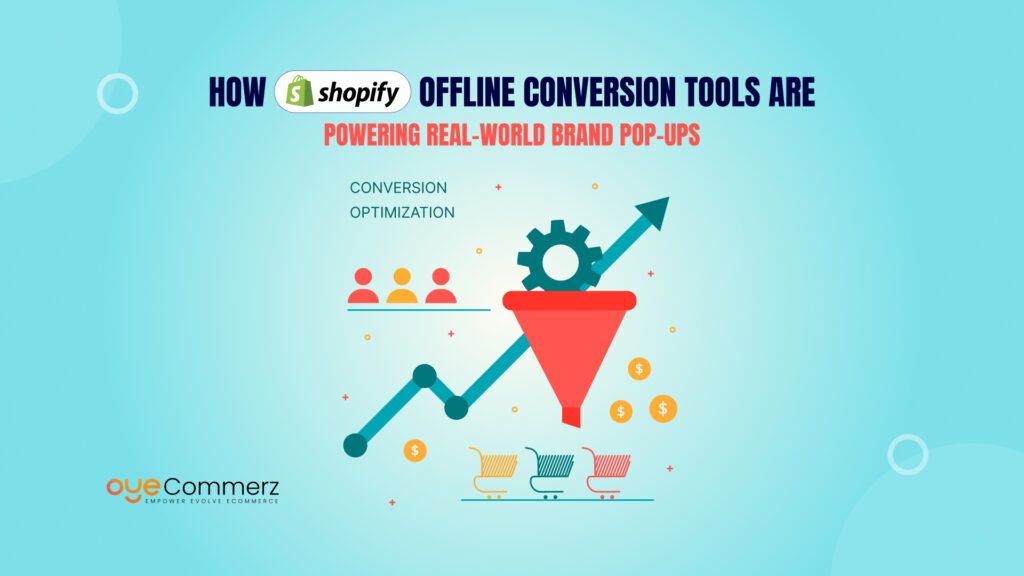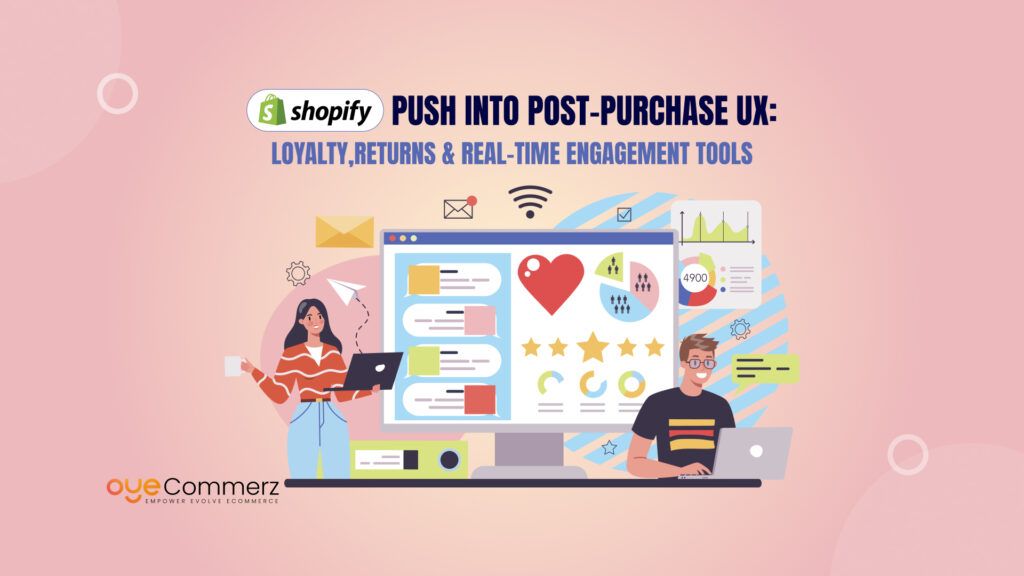Choosing the right e-commerce platform can significantly impact your online business’s success. In the battle of Shopify vs WordPress, both platforms offer unique advantages tailored to different business needs. Shopify stands out as a user-friendly, all-in-one solution designed specifically for e-commerce, making it ideal for those seeking a straightforward setup and robust support. Conversely, WordPress provides unparalleled flexibility and customization options, appealing to businesses that prioritize control over every aspect of their site. As we delve deeper into this comparison, we’ll explore the features, usability, and costs associated with each platform, helping you make an informed decision that aligns with your business goals and technical expertise.
Table of Contents
ToggleShopify: Streamlined and User-Friendly
Shopify, often regarded as the embodiment of convenience, offers an all-in-one e-commerce solution tailored for entrepreneurs seeking a straightforward, hassle-free journey into online sales. This platform embodies the adage that time is money, sparing you from the complexities of managing web hosting, security, and other technical intricacies. It’s user-friendly and known for its quick setup, making it an attractive choice for business owners who prefer to focus on their products and customers rather than the technicalities of running a website.
WordPress: Versatile and Customizable
WordPress, on the other hand, is synonymous with versatility. As a highly adaptable content management system (CMS), it not only facilitates content creation but also serves as a potent e-commerce platform with the WooCommerce plugin. While it offers the freedom to sculpt your website to your exact specifications, it requires a bit more technical prowess, especially for self-hosting and manual setup. The trade-off is immense flexibility and endless customization possibilities.
The journey of choosing between Shopify and WordPress, as we’ll explore in the upcoming sections, isn’t a one-size-fits-all affair. It’s a nuanced decision influenced by a series of considerations, such as your budget, technical proficiency, design preferences, e-commerce features, and future scalability. Our aim is to equip you with the insights needed to match the right e-commerce platform with your unique business goals and visions. So, let’s dive into the details and embark on the path to selecting the best e-commerce platform for your online venture.
Shopify vs. WordPress: A Detailed Comparison
When venturing into the world of e-commerce, choosing the right platform is a decision that can greatly impact the success of your online business. Shopify and WordPress, both renowned e-commerce solutions, offer distinct advantages and cater to different needs. In this in-depth comparison, we’ll explore key aspects, giving Shopify the limelight to help you make an informed decision.
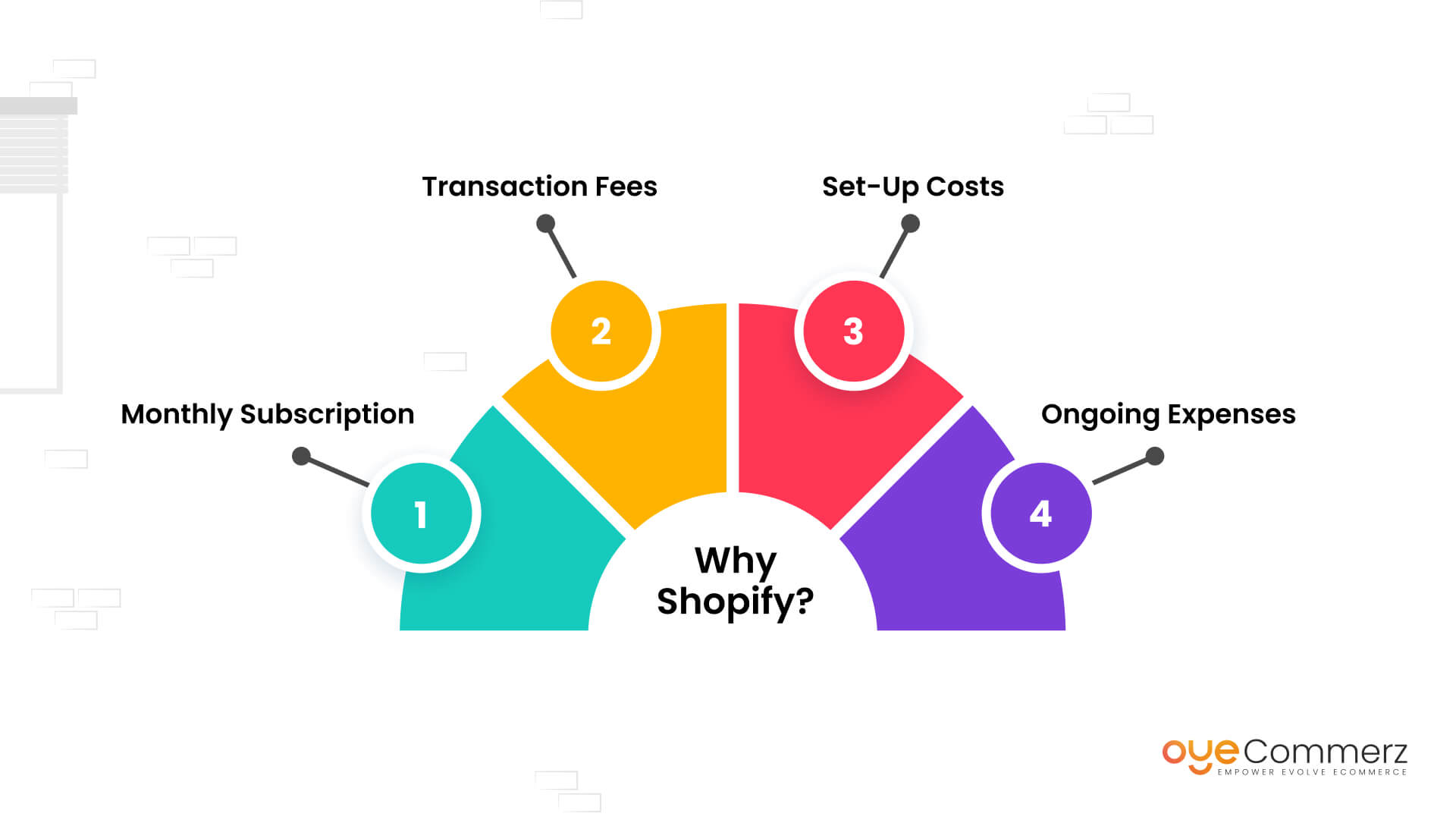
Pricing and Costs: Shopify's Predictability vs. WordPress's Flexibility
Shopify: Predictability and Streamlined Pricing
Shopify is a poster child for streamlined pricing. Its simplicity and predictability make it a top choice for many e-commerce entrepreneurs.
- Monthly Subscription: Shopify offers clear-cut pricing plans. From the Basic Shopify plan at $29 per month to the Advanced Shopify plan at $299 per month, these plans encompass everything you need, including hosting, security, and support. There’s also the Shopify Lite plan at $9 per month, which is perfect for small businesses or those looking to add e-commerce functionality to an existing website.
- Transaction Fees: The transaction fees vary depending on the plan you choose. While they range from 2.4% + 30 cents to 2.9% + 30 cents, Shopify waives these fees entirely if you use its in-house payment gateway, Shopify Payments.
- Set-Up Costs: With Shopify, there are no hidden set-up costs. Everything is bundled into your monthly subscription fee, providing you with clarity and predictability.
- Ongoing Expenses: Apart from the monthly subscription, you may have expenses related to third-party apps and themes. However, these are additional costs you can control.
WordPress: Flexibility with a Learning Curve
WordPress, while immensely versatile, requires a bit more technical proficiency, and you’ll need to become accustomed to the e-commerce plugin, WooCommerce:
- Setup: Setting up a WordPress site involves more steps, including domain registration, web hosting setup, and WordPress installation. If you’re not familiar with these processes, it might take some time to learn.
- Customization: WordPress’s strength lies in its vast selection of themes and plugins. While this offers unparalleled flexibility and customization, it can also mean a steeper learning curve, especially if you plan to delve into the technical aspects of your site’s design.
- Day-to-Day Management: Once your WordPress site is set up, managing it is relatively straightforward. However, you might need to invest more time in initial setup and customization compared to Shopify.
- Plugin Installation: To add specific features or functionality, you’ll need to install and configure plugins. While this offers flexibility, it can also involve more manual setup and potential compatibility issues.
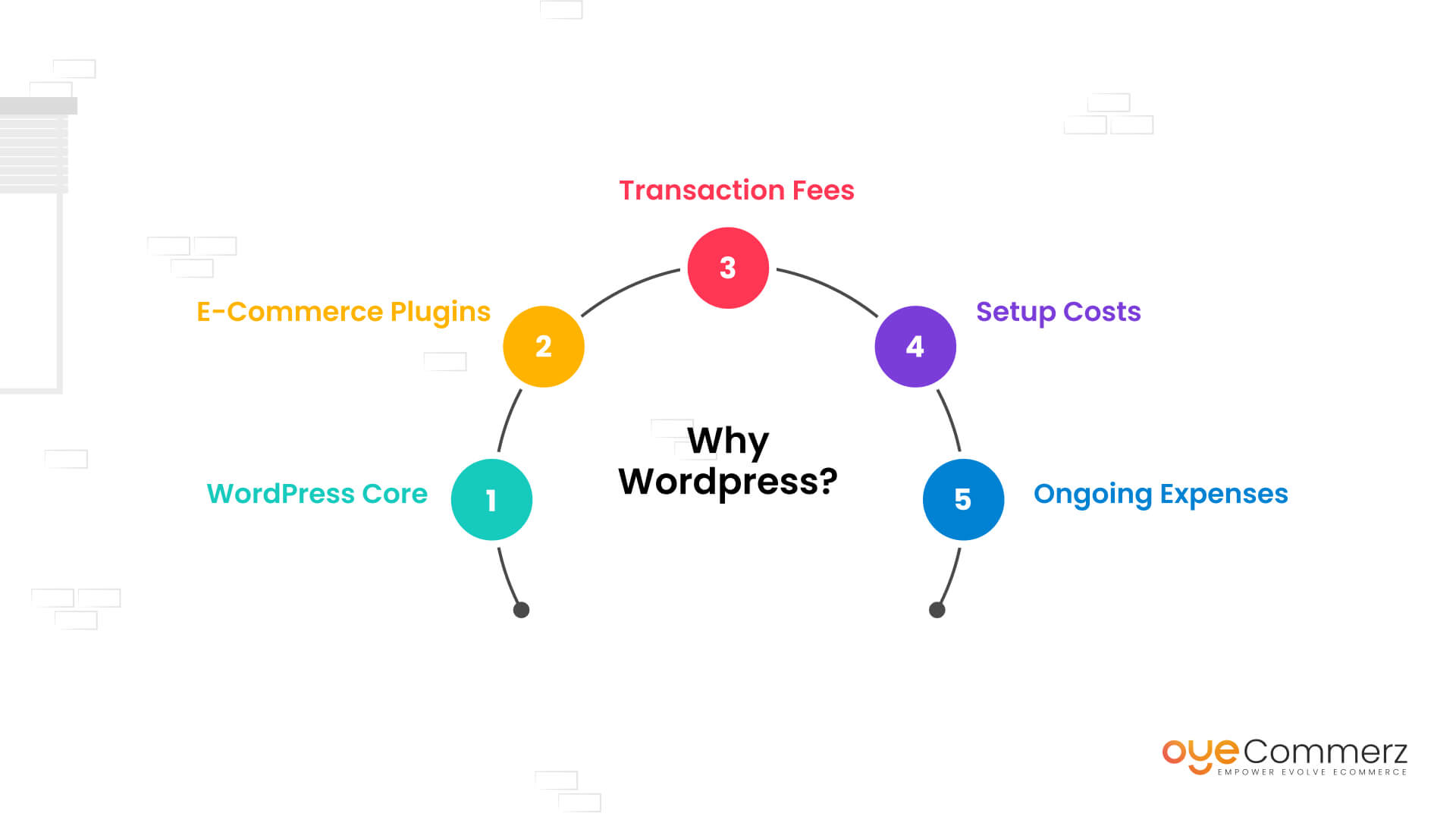
Advantage Shopify: Simplicity and Accessibility
The ease-of-use advantage goes to Shopify. If you’re looking for a hassle-free and user-friendly e-commerce solution that doesn’t require extensive technical skills, Shopify is the clear choice. Its intuitive interface, ready-made themes, and straightforward customization tools make it accessible to beginners and experienced entrepreneurs alike.
For business owners seeking a rapid entry into e-commerce without a steep learning curve, Shopify shines as the top pick. It’s designed to simplify the setup and management of your online store, allowing you to focus on your products and customers.
Design and Customization: Shopify's Elegance vs. WordPress's Flexibility
Shopify: Elegance and User-Friendly Design
Shopify places a strong emphasis on design and aesthetics, offering a range of professionally designed themes:
- Theme Selection: Shopify’s theme store boasts a variety of themes, both free and premium. The themes are designed with e-commerce in mind, featuring elegant layouts, product displays, and responsive designs.
- Customization: Shopify’s drag-and-drop interface simplifies the customization process. Even if you’re not a web designer, you can easily modify your theme’s appearance, colors, and fonts.
- Mobile Responsiveness: All Shopify themes are mobile-responsive, ensuring that your store looks great on a variety of devices. This is a crucial feature as mobile shopping continues to grow.
- App Store: If you require additional features, Shopify’s App Store offers a plethora of apps that seamlessly integrate with your theme. You can extend your store’s capabilities without compromising design.
WordPress: Flexibility and Endless Customization
WordPress offers unmatched design flexibility, but it requires more hands-on effort and potentially a deeper understanding of design principles:
- Theme Selection: WordPress provides access to a vast library of themes, ranging from free to premium options. You can find themes suitable for a wide array of niches and styles. However, not all themes are tailored for e-commerce, so you’ll need to choose one that fits your needs.
- Customization: With WordPress, you have the freedom to tweak every aspect of your site’s design. Themes can be customized extensively, and you can make changes directly in the theme files if you possess coding skills. This level of customization offers unparalleled creative control.
- Mobile Responsiveness: Ensuring your WordPress site is mobile-responsive may require additional effort, especially if the chosen theme doesn’t prioritize mobile design. While many themes are responsive, you may need to adjust.
- Plugin Integration: WordPress’s strength lies in its extensive plugin library, which can enhance your store’s functionality. However, you may need to ensure that your chosen theme is compatible with the e-commerce plugins you want to use.
Advantage Shopify: Built-In E-Commerce Features for Simplicity
Shopify takes the lead in e-commerce features due to its all-in-one approach. The platform is meticulously designed to cater to online sellers, providing a comprehensive suite of features that are essential for a successful e-commerce operation. With Shopify, you have a clear advantage in terms of product management, payment processing, shopping cart functionality, and inventory control, all of which are seamlessly integrated into the platform.
Shopify’s commitment to security is evident, with SSL certificates and PCI DSS compliance ensuring a safe and secure shopping experience for your customers. Additionally, the App Store offers a wide array of third-party apps that further enhance your store’s capabilities.
While WordPress, with WooCommerce and its extensive plugin library, offers versatility, it requires more effort to piece together a comprehensive e-commerce solution. You’ll need to carefully select and configure the right plugins to achieve the desired functionality, which can involve more manual setup and potential compatibility issues.
Shopify’s focus on streamlining the e-commerce experience simplifies the process for online sellers and offers a competitive edge in this category. Let’s move on to the comparison of SEO and marketing capabilities, another critical aspect for e-commerce success.
E-Commerce Features: Shopify's Streamlined Approach vs. WordPress's Plugin-Powered Versatility
Shopify: Built-In E-Commerce Features
Shopify shines when it comes to e-commerce features. It’s tailored for the online selling experience and provides an array of tools to make your life easier:
- Product Management: Shopify’s product management system is user-friendly, allowing you to add, edit, and organize your products effortlessly. You can easily categorize your products, set prices, manage inventory, and offer discounts.
- Payment Gateways: Shopify offers a range of payment gateways, including its in-house solution, Shopify Payments. It simplifies payment processing and ensures a seamless checkout experience for customers.
- Shopping Cart: The shopping cart functionality is built into Shopify, ensuring a hassle-free and secure shopping experience. Customers can easily add and remove items, calculate shipping costs, and proceed to checkout.
- Inventory Control: Inventory management is a breeze with Shopify. You can keep track of stock levels, receive notifications when products are running low, and manage product variants.
- Security: Security is a top priority for Shopify. The platform provides SSL certificates and is PCI DSS (Payment Card Industry Data Security Standard) compliant, ensuring that sensitive customer data is protected.
- App Store: If you need additional features or integrations, Shopify’s App Store is a treasure trove of apps that seamlessly integrate with your store. Whether you need marketing tools, customer support solutions, or analytics, you’ll find it here.
WordPress: Plugin-Powered Versatility
WordPress’s e-commerce prowess comes in the form of plugins, with WooCommerce being the most popular choice. Here’s what you can expect:
- Product Management: WooCommerce, the dominant e-commerce plugin for WordPress, offers extensive product management capabilities. You can create and manage product listings, set prices, and organize products into categories.
- Payment Gateways: WooCommerce has a lot of options for payment gateways. However, the extent of supported gateways may depend on the specific plugins or extensions you choose to use.
- Shopping Cart: The shopping cart functionality is provided by WooCommerce, ensuring a seamless and integrated shopping experience for customers.
- Inventory Control: WooCommerce offers inventory management features, allowing you to track product stock levels and receive alerts when inventory is low.
- Security: WordPress security largely depends on your hosting provider, the quality of the plugins you use, and how well you’ve configured your site. Ensuring the safety of your e-commerce site may require additional effort.
- Plugin Integration: The power of WordPress lies in its extensive plugin library. You can extend the functionality of your e-commerce store with various plugins. However, plugin compatibility and potential conflicts should be monitored carefully.
Advantage Shopify: Built-In E-Commerce Features for Simplicity
Shopify takes the lead in e-commerce features due to its all-in-one approach. The platform is meticulously designed to cater to online sellers, providing a comprehensive suite of features that are essential for a successful e-commerce operation. With Shopify, you have a clear advantage in terms of product management, payment processing, shopping cart functionality, and inventory control, all of which are seamlessly integrated into the platform.
Shopify’s commitment to security is evident, with SSL certificates and PCI DSS compliance ensuring a safe and secure shopping experience for your customers. Additionally, the App Store offers a wide array of third-party apps that further enhance your store’s capabilities.
While WordPress, with WooCommerce and its extensive plugin library, offers versatility, it requires more effort to piece together a comprehensive e-commerce solution. You’ll need to carefully select and configure the right plugins to achieve the desired functionality, which can involve more manual setup and potential compatibility issues.
Shopify’s focus on streamlining the e-commerce experience simplifies the process for online sellers and offers a competitive edge in this category. Let’s move on to the comparison of SEO and marketing capabilities, another critical aspect for e-commerce success.
SEO and Marketing: Shopify's Integrated Approach vs. WordPress's Plugin Arsenal
Shopify: SEO and Marketing Integration
Shopify ensures that your online store is equipped with essential SEO and marketing tools:
- SEO Features: Shopify incorporates built-in SEO features to help your store rank higher in search engine results. You can customize page titles, meta descriptions, and URLs to optimize your store’s visibility.
- Blogging: Shopify includes a built-in blogging platform. Blogging is a valuable tool for content marketing, and it’s seamlessly integrated into your store. You can create and publish blog posts to engage your audience and improve SEO.
- Social Media Integration: Shopify offers seamless integration with social media platforms. You can connect your store to your social media accounts, allowing for easy sharing of products and content.
- Email Marketing: Email marketing is a potent tool for engaging with customers. Shopify provides email marketing features that enable you to send newsletters, promotions, and updates to your subscribers.
- App Store: If you require more advanced marketing tools, Shopify’s App Store offers a wide selection of apps. Whether you need analytics, email marketing automation, or affiliate marketing solutions, you can find them here.
WordPress: SEO and Marketing with Plugins
WordPress, being highly customizable, offers a wealth of SEO and marketing plugins to enhance your online presence:
- SEO Plugins: WordPress boasts a vibrant ecosystem of SEO plugins, including popular choices like Yoast SEO and All in One SEO Pack. These plugins provide in-depth SEO features, allowing you to optimize your website for search engines.
- Blogging Plugins: While Shopify offers a built-in blogging platform, WordPress takes blogging to the next level with a plethora of blogging plugins. With these, you can enhance your content marketing strategy by adding features like related posts, social sharing buttons, and more.
- Social Media Integration: WordPress isn’t lacking in social media integration capabilities. You can seamlessly connect your WordPress site to your social media accounts, just like Shopify.
- Email Marketing Plugins: Email marketing is a powerful tool for customer engagement, and WordPress offers a variety of email marketing plugins. Popular options like Mailchimp for WordPress and SendinBlue integrate seamlessly with your WordPress site, allowing you to manage email subscriptions, send newsletters, and automate email campaigns.
- Plugin Diversity: One of WordPress’s major strengths lies in its vast plugin library, encompassing a wide range of marketing tools. These plugins cater to various needs, such as analytics, email marketing automation, and affiliate marketing solutions. This diversity empowers you to choose and customize the plugins that align with your specific marketing goals.
Seamlessly Migrate from WordPress to Shopify with Oyecommerz
Tired of WordPress limitations? Switch to Shopify for a faster, more secure, and scalable eCommerce experience. At Oyecommerz, we ensure a smooth, hassle-free migration with zero downtime, preserving your SEO, products, and customer data.
Let’s build a powerful Shopify store for your business! Get started today. Contact Us Now
"Shopify or WordPress for your e-commerce journey? It's a choice! Explore features, test functionality, and tailor to your needs. Let your business take center stage for a stellar performance."
Conclusion: A Matter of Integration vs. Versatility
In the end, whether you opt for Shopify or WordPress, both platforms offer the potential to enhance your online visibility, engage with customers effectively, and drive your e-commerce business to greater success. The key is to align your choice with your specific needs, ensuring that your SEO and marketing efforts are in perfect harmony with your overall business strategy.
Optimize your e-commerce transition with OyeCommerz’s WordPress to Shopify Migration Services. Our skilled team facilitates a secure and efficient migration, ensuring your store leverages Shopify’s advanced features for superior performance and scalability. With OyeCommerz, experience a frictionless move to a more dynamic and user-friendly e-commerce platform. Elevate your business with our dedicated support throughout your WordPress to Shopify migration journey.

